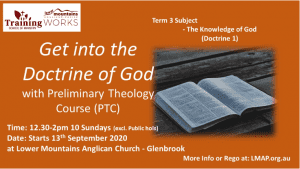Unless you are in a high risk group you should go back to church and help serve again in building up your local expression of Jesus’ body.
Read more . . .
Church, the Flesh and the Devil
The gospel according to a 5-year-old
When my kids were young, I had the idea to talk with them about the gospel over dinner so that we could discuss together about what it means for us to follow Jesus. (Dinnertimes were pretty crazy with three kids under ten and the usual debates over the necessity and place of vegetables in the created order, so it was an ambitious goal.) My husband suggested that the best way to start might be to teach them the gospel outline Two Ways to Live and to make it super fun.
Read more . . .
Andrew and Andrew at St Andrew’s
Once upon a time there were two guys named Andrew. They both loved Jesus and both started an MTS traineeship on the same day, in the year 2000. Last week they were both ordained as presbyters in a service at St Andrew’s Cathedral.
Read more . . .
Plagues and Protestants
Plagues and Protestants
Read more . . .
It’s an emergency! Let’s not get comfortable
Wherever the gospel has taken hold in the hearts of people, they have gathered (sometimes in secret and at great cost). This emergency online provision is just that, an emergency online provision, and, please God, that emergency will soon be over.
Read more . . .
Lower Blue Mountains TrainingWORKS
Rev Ken Noakes has taught PTC subjects in his pastor training trips to India and Sri Lanka and at his former churches in Adelaide and North Sydney. He recently shared about a training initiative involving PTC in the Lower Mountains where he is now at church.
TrainingWORKS – School of Ministry started this year in March with 30 people doing Introduction to the Bible. They met in person for 3 weeks, until COVID-19 shut down face-to face meetings. Training quickly evolved into seminar style presentations, which were recorded for people to watch later on YouTube. This complemented the online resources provided by Moore College and allowed the group to complete the unit together and on time. A second TrainingWORKS unit began in June doing New Testament 1. After starting online they were able to start meeting in person, and continued recording the sessions for those unable to be there. The third unit Doctrine 1 starts in September – again face to face with sessions recorded for those who can not meet face to face.
The plan is to offer 3 PTC units each year, being taught in face to face groups by mature Christian leaders. The ideal will be to have a co-operative training partnership with other local churches. This would mean they could start new people off doing Level 1 units, while helping others to continue studying later units. In Ken’s words, “With more trainers we could offer more PTC units, at more times, and at more places and so cater for different groups of people”.
The plan for TrainingWORKS is bigger than running PTC courses. Under God, Ken wants to see more Christians equipped and confident in different ministries like Kids or Youth Ministry, Bible Study and Gathering leading. “PTC helps people get into the Bible for themselves. It gives them tools to grow as disciples and to make disciples of Christ.”
Please pray for Ken and the TrainingWORKS – School of Ministry team. More info found here. Search for LMAPTV on YouTube if you are interested.
Read more . . .





